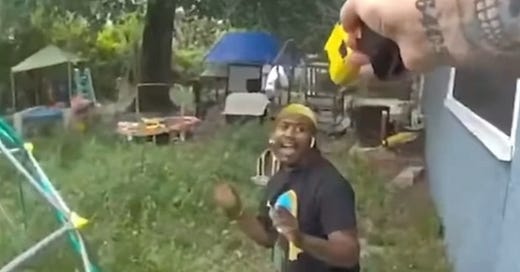Sometimes the most effective way to help out a fellow officer is to tap yourself into a situation and take control - while they take a breath.
I was recently watching police body cam footage from Marion County, Florida from June 27, 2025 where the series of events went like this:
Traffic stop for tinted windows, obscured plate, and “erratic” driving.
Jordan Skeene (the driver) “rammed” (backed into) the patrol vehicle as he fled.
There was a vehicle pursuit and a P.I.T. Maneuver.
Jordan then fled on foot and gave up once the deputy caught up to him.
Jordan was taken into custody without incident in the presence of multiple deputies.
The Issue
From start to finish during this incident the deputies did a great job - a criminal who fled from police was apprehended without any force (aside from the P.I.T.) being utilized. The suspect was not injured and the deputies weren’t either.
The issue is - who took custody after handcuffing.
Over the radio the involved deputy voiced that he had been “rammed” by the suspect. The deputy was then involved in a vehicle pursuit, P.I.T, and foot pursuit - before he apprehended the suspect at Taser point.
It should have been apparent that in a short period of time the deputy went through a lot and his adrenaline was spiking to intense levels.
If that was missed on the other deputies - as he ‘assisted’ the suspect to his feet he yelled, “I have never seen anyone act like you!!!!”
**If you are one of the other deputies on scene - that is your cue! **
Tap yourself in, take control, grab the suspect by the arm, and tell your buddy to take a breath.
Give the involved officer something to focus on:
Tell him you “got this”, offer to transport, or even assign him a job -
“call sarge”, “start the criminal complaint”, “check yourself for injuries”, etc…
The instant that the involved deputy let’s go of the bad guy - he/she will most likely take the opportunity to process what just happened and refocus. That is an essential part of this process.
Too Often
Too often situations like this end with the officer using unnecessary force during the walk to the patrol car. In the era of body cams - the boilerplate language that we were all taught: “I escorted the suspect” and “assisted him into the vehicle” was really, dragging the asshole across a parking lot and throwing him into the police car like a lawn dart - is no longer acceptable.
Too often good cops who do a good job let their natural emotions overcome objectivity in these situations.
Of course police officers are responsible for their actions. But, the rage of being face-to-face with a suspect that just tried to harm you and subsequently attempted to flee into reckless anonymity - can blindside even the most reasonable officer.
To Clarify
The deputy in this case yelled at the suspect as he escorted him to the police vehicle but did not use any unnecessary force. Not all officers have this restraint, but I am glad this guy did. He is clearly a professional.
Help
So, help each other when you are out there.
If you can help your fellow officer from heading down an anger-fueled rabbit hole after an intense incident with an awful suspect - that can possibly lead to administrative or criminal sanctions - seize the opportunity to disrupt - it may be one the best things that you ever do in your career.
An Additional Point
The suspect was taken into custody without any force being utilized.
I always preach that a suspect can make a lot of mistakes, but as long as they do not fight with police officers during arrest - they will probably be ok. That was true in this case - someone go and tell Ben Crump.
Final Thoughts
The politicians who control the police agency will disavow you far quicker than they hired you.
Many citizens (whom you risked your life to protect) will quip a snide comment on social media before they ever waste a second to recognize your sacrifice.
No temporary pain inflicted on a single suspect is worth your career.
Slow down, take a breath, and allow your friends to help. Before and after every shift - take a second to remember that you are in this wild mess together.





Thank you for writing this. I think you're writing about a vital issue and concern, and it's really about discerning how to balance law enforcement training with treating suspects or detainees with dignity as humans. I read a book several years ago called "My Grandmother's Hands" by Resmaa Menakem, and he offers an entire chapter on how law enforcement agencies might incorporate trauma-informed training and therapy to their employees. I thought that was a good solution to this, because there have been many times my husband and I will watch COPS reruns, and I cringe when I see an officer or deputy shove someone in the back of a patrol car while screaming in their face. I am recognizing trauma responses in them both: in the officer who is likely reacting rather than responding, and in the suspect whose fight/flight/freeze reaction did not fit the context of the situation but appeared to be some sort of emotional flashback. What you wrote today really contributes a way to move forward.